
A Production Production©1998–2025 Dustin Putman

|

 |


If we're going strictly by numbers, 2012 was the best year for cinema in at least a decade. With 18 pictures rating at four and three-and-a-half stars (the "great" range), that's more than any year since 2002. Likewise, in counting the one-star-and-lower releases (the "bad" range), the total count of 12 is smaller than in any year since 2001, and that was during a time when I was reviewing far fewer films in a single twelve-month period. Even as the months passed by, something felt different. There was less overwhelming mediocrity than the norm, fewer outright disasters, and plenty of major surprises that slipped right in under the radar to become some of the best releases of the year. 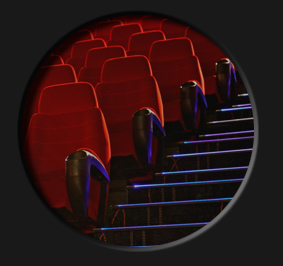 Also, thankfully, there seemed to be an increase in original ideas and less remakes and sequels—always a plus.
Food for thought: all, or at least most, of the movies you'll be hearing about again and again during this year's awards season won't be making more than cursory appearances below. Frankly, as strong as some of the front-runners are (" Zero Dark Thirty," for example), I believe there are plenty of even more superior films that came out in 2012, many which you may have missed or not even heard of before. My top choice for the year's best picture won't be receiving more than some technical nominations at the Oscars, but it's also the kind of divisive, one-of-a-kind piece of art that transcends easily-defined conventional cinema—the well-made but overly familiar " Argo"s of the world, if you will—and takes time to build in reverence. Remember that "2001: A Space Odyssey" was considered a failure upon release. "Vertigo," too. Now they are widely believed to be the best of the best in movies. So it goes with the tides of time.
The format remains the same from my previous "Year in Review" essays. In order, first I list the best performances of the year, the ones that made the biggest mark on my lasting memory (with the ultimate winner highlighted in red), followed by my picks for the single most overrated and underrated films of the last twelve months. Topping things off are my complete lists for the absolute best and worst motion pictures 2012 had to offer. This was a deeply reassuring year at the movies, and one can only hope this mini-resurgence of inspiration will continue into 2013. 
(my pick for the absolute best is indicated in red)
Best Actor
Best Actress
Best Supporting Actor
Best Supporting Actress

"Lincoln," directed by Steven Spielberg, is such an epic misfire it is downright mystifying how and why so many critics are falling all over themselves to praise it. Was this really the vision anyone had in their mind when an Abraham Lincoln biopic starring Daniel Day-Lewis and helmed by Steven Spielberg was first announced? Bypassing insight for a dreary, limited-scoped chamber piece set over the final months in Lincoln's life, the film bypasses all chance to make the title man a complex character for a grossly idealistic portrait of the political process that went into getting a Thirteenth Amendment passed to abolish slavery. Did you know Lincoln was actually racist, despite his wrangling to get this law accepted by the House of Representatives? You'd never know it—or that Spielberg had anything to do with the finished project—based on the haphazard, emotionally frigid, aesthetically flat finished product. Even the great Day-Lewis is wasted by the script.
Overrated Runners-Up: Argo; Les Misérables; Marvel's The Avengers; The Master; Moonrise Kingdom; Salmon Fishing in the Yemen; Silver Linings Playbook

"The Perks of Being a Wallflower," directed by Stephen Chbosky, was botched from moment one by its distributor, Summit Entertainment, a studio that had no problem releasing the treacly " Twilight" series, the middle-of-the-road thriller "Gone," and sci-fi garbage like " The Darkest Hour" on thousands upon thousands of screens, but suddenly—and cluelessly—got cold feet when it came time to release unto the world an actual quality motion picture. One of the truest, most gloriously non-stereotypical coming-of-age dramas in recent memory, based on Chbosky's own novel, "The Perks of Being a Wallflower" tells of one year in the life of high school freshman Charlie (Logan Lerman), an outsider who finds acceptance with a group of seniors, so-called "misfit toys" led by step-siblings Patrick (Ezra Miller) and Sam (Emma Watson). He will never be the same again. Smart and passionate, the film will speak to teenagers and adults equally, and on different planes. For those around the same ages as the leads, they will take comfort in not being talked down to and recognize their own joys and hardships in the people looking back at them. For older viewers, there is something more profound to be had at looking back at this time in hindsight, understanding how quickly the time goes and wishing that we knew then what we do now. Naturally, Summit opened the movie very, very slowly and never did widen it beyond a few measly hundred screens. There is no more potent example of Hollywood awarding the low-brow over genuine intelligence, causing the wonderful movie in question to pay the bitter price of its own goodness.
Underrated Runners-Up: Beyond the Black Rainbow; Chernobyl Diaries; Detention; Entrance; Hit & Run; In Their Skin; Jeff, Who Lives at Home; Mirror Mirror; Perfect Sense; Ruby Sparks; Snow White and the Huntsman; 10 Years; V/H/S; Wanderlust

 | The Devil Inside
The first release of 2012 was one of its worst, a found-footage faux documentary so mind-bogglingly asinine and dopey it was nothing short of a slap in the face to horror enthusiasts everywhere. PG-13-rated thrillers about demonic possession can potentially be done well—see 2005's chilling "The Exorcism of Emily Rose" for an example—but this one, from director William Brent Bell, he of 2006's dim-witted "Stay Alive" infamy, was laughably hopeless. The Devil Inside" ratchets the stupid, nonsensical stakes right near the end, but lacks an understanding of momentum or even a signal that the third act has gotten underway. Bereft of thematic consequence and having solved nothing, when the film abruptly cuts to black and, no kidding, provides the URL for a website to learn more about the case, it's enough to make one want to break into the projector's booth and burn the celluloid. |
 |
 | Alex Cross
In another case of "what were they thinking?" author James Patterson's title detective received a revival of sorts starring Tyler Perry, and if there's one black actor who probably shouldn't be filling the shoes of a stately icon like Morgan Freeman, it's the writer-director-star best known for putting on a wig, dress and fat suit to play the cantankerous Madea. An inadvertently comic ode to 1990s-style serial killer thrillers directed by Rob Cohen, "Alex Cross" was one of the most ineptly written films of the year, a whirlwind of laughable dialogue, unlikely and inexplicable plot developments, and a climactic fight set-piece so incomprehensibly shaky and indistinct in its shooting that it was impossible to figure out who was throwing which punch, let alone what was happening overall. No one sets out to make a bad movie, but occasionally all the pieces fail to congeal and the outcome is a blundering mess. "Alex Cross" was such an instance. |
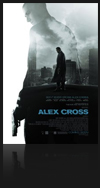 |
 | A Thousand Words
It wouldn't be a typical year at the movies without a much-delayed Eddie Murphy comedy, and "A Thousand Words," filmed in 2008 by director Brian Robbins, was just such a woebegone project. The story of a selfish literary agent who learns to appreciate his life more when he discovers he only has a thousand words left to utter, the film had no idea what it wanted to do or be, thereby opting to do and be nothing at all. At some point in its inception, it might have meant well. What reached the screen, however, was unrecognizable, a desperate, amateurish trifle of confused tonal shifts, ill-advised editing, and soppy, disingenuous grand-standing. It wasn't the least bit funny or touching, and it all went down about as smoothly as cyanide laced with rusted nails. It took "A Thousand Words" four years to see the light of day. Another four—or thousand—wouldn't have hurt anyone. |
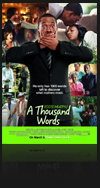 |
 | One for the Money
Janet Evanovich's Stephanie Plum novels are page-turning bestsellers for a reason, but her first film adaptation, "One for the Money," was so hopelessly tone-deaf and clunky it single-handedly put the kibosh on Plum's cinematic misadventures in one fell swoop. Directed by Julie Anne Robinson and starring Katherine Heigl as the makeshift bounty hunter, the picture was slow as molasses and as vapid as the dreary figures on the screen, oozing lethargically from scene to scene as it wrestled with a leaden, distinctly unromantic romance and action that basically boiled down to a five-second shootout. Looking for laughs? There were a total of zero. "Luckily, his car wasn't too hard to follow," Stephanie says in voiceover about keeping track of Joe. "It was pretty flashy...and yellow." If you're busting a gut yet, rest assured the writing never raised above this painfully cornball, sub-sitcom level. |
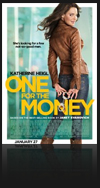 |
 | The Expendables 2
Twice now, an ensemble filled with the most popular action movie stars of the last thirty years has been squandered in a joyless cacophony of bad filmmaking (Simon West takes the inglorious reigns this time). Ignorantly unaware of how mean-spirited it is, "The Expendables 2" is set up as a silly popcorn picture where things go boom a lot. That's all fine and well, except the violence is portrayed with such a blood-thirsty relish that it kind of strips the so-called heroes from coming off as, you know, heroic. With no consequences to their actions and no legitimate roles to play, the movie is but an empty-souled vessel where legendary performers show up in the same room and then stand around with little of interest to say or do. It is such a waste. From afar, "The Expendables 2" sounds like it should be a blast. Why, then, is the reality about as fun as chewing on a hand grenade? |
 |
 | Lincoln
For all of the talented artists and craftspeople in front of and behind the camera, and for all of the wrongheaded decisions that were made bringing the project to fruition, "Lincoln" was easily the year's most disappointing film, a downright abysmal charade that managed to paint an uninformative, grade school-level portrait of the 16th President of the United States while casting a light of idolatry on the man, layers and tough realism be damned. Watching the film, it is impossible to even entertain the vision of a filmmaker such as Steven Spielberg being behind the camera; amateurish on nearly every level—the actors look understandably stranded and listless, dozing off in the background of scenes, while the movie's visual scope roughly equates to a person looking through binoculars with the lens caps still on—the film more accurately resembles a low-budget indie made by a first-time director who not only shouldn't work in the profession again, but will be truly lucky just to find a distribution deal. |
 |
 | Red Tails
Here is another disastrous historical drama, this one about the Tuskegee Airmen's heroic, all-black 332nd Fighter Group during World War II, and if what's on display is to be taken for truth, the goings-on must have occurred on theme park backlots posing as 1940s Italy and its brave military men must have been rejects from the "Amos 'n' Andy" minstrel hour. Dialogue strictly hailing from a "How Not to Write a Screenplay in 30 Days" handbook is rampant with out-of-place one-liners and antiquated chestnuts (before the opening credits are over, someone has already tearfully pleaded, "Stay with me!" to an injured comrade). Characters are stereotypical "good-ol'-boy" types told apart by a single trait—i.e., the hot-tempered daredevil; the rosy-cheeked innocent; the level-headed grounding force; the guitar-strumming simpleton—while the Caucasians hanging around the periphery are portrayed wholesale as ignorant, racially intolerant clichés. Executive producer George Lucas allegedly had been spearheading this project since 1988 so his heart must have been in the right place early on. What director Anthony Hemingway, a television vet making his inauspicious feature debut, ended up with, however, was a smug, drippy, egotistical slice of war malarkey. If there was anything authentic about it, it was merely a fluke. |
 |
 | Battlefield America
"Battlefield America" has to be seen to be believed, but please don't see it. It's the kind of film that went so wrong in so many ways, it legitimately makes one wonder how it got made without a single person raising so much as an eyebrow at the foolishness being put on camera. One of the most technically inept feature films to see the light of day in years, it's a stirring pot of so many spare clichés that it soon becomes its own laughing stock, inadvertently working as a spoof like 2009's "Dance Flick" despite wearing on its sleeve heightened emotions so maudlin and overpoweringly earnest it could only have been intended as high drama. If that weren't enough, dialogue is embarrassingly on-the-nose, the editing has been done with a gummed-up chainsaw—scenes start and end with no rhythm, let alone a beginning or ending—and the dance set-pieces are an incoherent series of split-second shots that make no sense or do the performers any favors. The haphazard handling of the picture's would-be bread and butter is frustrating, but not as much as sitting through the other 80 minutes of bad soap-opera filler. "Battlefield America" is on a plane of awful few movies reach, yet it doesn't quite warrant a star rating of zero. On whatever planet director Christopher B. Stokes comes from, his heart seems to have been in the right place. By Earth's standards, he's made the equivalent of a small-scale disaster. |
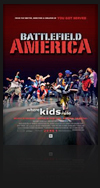 |
 | Cosmopolis
"My prostate is asymmetrical," says Eric. "There's a fungus between my toes," replies Benno. "It speaks to me." One thing is just about certain: "Cosmopolis" was made to speak to no one. Based on a novel by Don DeLillo, adapted for the screen by writer-director David Cronenberg, the film resembled a hack version of Bret Easton Ellis crossed with James Joyce's infamously nonsensical "Finnegans Wake." Art-house cinema at its most achingly smarmy and self-indulgent, it did not earn points for being different, but lost quite a fair share for methodically crawling around in circles, going nowhere whilst having nothing of value to say about wealth, soul-stealing corruption or crooked capitalism. Despite one particular character saying, "I don't know how to be indifferent," she and everyone else (including poor lead Robert Pattinson) walk through the narrative like dead-eyed zombies in a trance. They all speak in affected monotone voices, and the sentences that escape their lips are didactic, asinine, and barely coherent. Frustrating verging on abysmal verging on infuriating, to sit through "Cosmopolis" is to listen to petty, one-note whiners for the better part of two hours, droning away with dialogue that has been seemingly shuffled up and dumped out at random onto the script pages. That is not an exaggeration. |
 |
 | Project X
Out of 170+ films I reviewed in 2012, only "Project X" could be considered one that goes beyond terrible and into outright dangerous and evil territory. So inane, so bereft of a point, so left wanting for a thought in its shrunken doll-sized little head that it's difficult to accept as anything other than an elaborate prank, the picture—a pseudo-documentary account of a teenage house party that gets way, way out of hand—was but a random collage of blatant sexism, hate speech, racial and spiritual insensitivity, and horrible animal abuse. Making a person single-handedly fear for the youth of America, "Project X" was classless, mean-spirited, repugnant, deplorable, off-puttingly sleazy, and thoroughly contemptible. It was also searingly depressing—there wasn't a true laugh in sight—as well as worthless on every cinematic level one could name, imagine, or dream up. There was no more dismaying cinematic experience this year. |
 |

 | ParaNorman
The ghastly, funny, heartfelt, indelibly meaningful "ParaNorman," directed by Chris Butler and Sam Fell, was no less than the most confident, fully realized, and just plain imaginative stop-motion animated feature since 1993's holiday classic "The Nightmare Before Christmas." A useful but never preachy morality tale about acceptance and the silliness and potential societal dangers of believing in superstitions, the film's protagonist was the unforgettable Norman Babcock (Kodi Smit-McPhee), an 11-year-old with the power to see ghosts who gets involved in the resurrection of small town Blithe Hollow's long-dead forefathers. Bursting with affectionate film references, a mischievous comic side, an obvious love for the horror genre, and a conclusion as eloquent as it is touching, "ParaNorman" was a dream sprung from autumn personified. |
 |
 | Sinister
It is basic human nature to be fascinated by the unknown, by things we cannot understand, and it is this specific brand of voyeurism that is at the blackened, macabre core of "Sinister." Directed with classically inspired relish by Scott Derrickson and terrifically written with a distinct lack of compromise by Derrickson and C. Robert Cargill, the film was a rarified breed in that it burrowed under the skin from the quietly petrifying first frame and stayed there for days after. A haunted house movie rooted in such reality that it barely felt like one, Derrickson's latest cinematic gut-punch married the supernatural with the kind of horrors that run rampant in the everyday world. That he did this so smartly, so methodically, and so deliberately injected the gradual pacing with an increasing level of anxiety-laden intrigue matched by our protagonist's experiences. One of the year's best, most shiver-inducing releases, Ethan Hawke received his meatiest role in over a decade as a true crime novelist getting more than he bargained for as he researches his latest book. As concerned with creating a suffocating, underlyingly doom-fraught mood as he is with providing jump scares—these are used sparingly, the spooky atmosphere far more effective than any gimmick with a musical stinger—Derrickson showed that he knew exactly what he was doing. Proudly joining the upper echelon of horror cinema, "Sinister" lived up to every inference its title alluded to. |
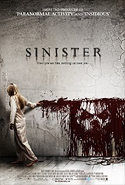 |
 | Jeff, Who Lives at Home
Jeff (Jason Segel) is thirty, unemployed, and still living at home, but his serendipitous path collides one eventful afternoon with the unusual life-changing events simultaneously occurring to his mother (Susan Sarandon) and older brother Pat (Ed Helms). Writer-directors Mark and Jay Duplass' mumblecore aesthetics are all in check—handheld, frequently zooming cinematography; a loosy-goosy narrative surveying docu-style lifelikeness in lieu of creaky, plot-centric clichés—but "Jeff, Who Lives at Home" dares to go a step further as it tweaks the formula of eavesdropping authenticity by highlighting it with moments of unanticipated, transformative grace. Magical realism is tougher to pull off in cinema than in literature, but the Duplass brothers have seemingly mastered this subjective and tonal challenge by allowing it to develop in a natural fashion that doesn't push too hard or spell things out. A deeply felt motion picture of human compassion and complexity—nothing is so easy as to fall the way of archetypes—it also, gradually but succinctly, arrives at a spiritually affirmative denouement, one that has nothing to do with religion and everything to do with the speck of a possibility that greater forces are at work out there. When it comes, the effect is pretty transcendent. "Jeff, Who Lives at Home" is unsuspectingly gentle and sublime. |
 |
 | Django Unchained
Quentin Tarantino mixes and matches movie genres and unapologetically anachronistic soundtrack cues with the glee and know-how that can only come from a die-hard film aficionado, and his dialogue, at once learned, thoughtful and deliriously off-the-wall, never ceases flowing like a poetic spring. A spaghetti western (equipped with a brand-new track from Ennio Morricone), a brains-popping revenge thriller set in Pre-Civil War slave territory, a devilish dark comedy, a love story of makeshift kings and princesses locked away in faraway castles—"Django Unchained" is all of this and, as is Tarantino's custom, so much more. Even taking into account a 165-minute running time that might have been wise to shave fifteen to twenty minutes from its final length, this was still the late holiday season's most dizzyingly imaginative and thoroughly pleasing release, an end-of-year jewel as chock-full of sizzling performances (including Christoph Waltz as a murderous, voice-of-reason bounty hunter and Leonardo DiCaprio as a hedonistic plantation owner) as it was bursting with busted knee caps and spurting innards. To see it—a proudly unique experience working just as well intellectually and emotionally as it did as giddy spectacle—was to not quite believe it. |
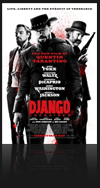 |
 | Take This Waltz
A confused 28-year-old woman (Michelle Williams) is torn between the comforts of her husband, Lou (Seth Rogen), and the excitement of her rugged neighbor, Daniel (Luke Kirby), in "Take This Waltz," one of the most incisive—and also one of the most non-objective—films in recent memory about adult relationships. Writer-director Sarah Polley and an almost stupefyingly brilliant Michelle Williams as Margot, deeply empathetic and emotionally exposed as she faces the fate she makes for herself, prove to be an ideal match. "Take This Waltz" sees no easy answers in Margot's actions, but it does see the tragedy in a certain corner of human nature where what we think is the right decision not always happens to be. Twice during the film, Margot rides The Scrambler, a beachside attraction that dizzyingly swings its passengers around to the classic tunes of yesteryear. The first time is with Daniel, and it's fun until she can't help her guilt from rearing its head. The second time is by herself, a provocative metaphor for her own mixed emotions. Never before has The Buggles' "Video Killed the Radio Star" been used to such hauntingly melancholic effect as in "Take This Waltz," a vividly articulated piece of work difficult to break free from. No matter which path Margot chooses, it is the other one not taken which is destined to haunt her, and us. |
 |
 | Entrance
The banal, ritualistic aspects of our lives creepily beget paranoia and outright terror in "Entrance," a rapturous display of just how very unforgettably effective a film can be that's been shot in twelve days on a budget of $6,000. Writer-directors Dallas Hallam and Patrick Horvath, along with co-writers Karen Gorham and Michelle Margolis, are major new talents hopefully on the cusp of grand success. What they've crafted here has been described as mumblecore with higher stakes, and that description sounds about right. Staying focused on Suzy (Suziey Block) for every shot, the picture serves as a poignant, low-key character study of a young woman searching for meaning in a place that appears increasingly hopeless beyond the palm trees and sunshine. Subtly but surely, however, arises a threat. Who or what it might be is unknown, but Suzy is aware of her surroundings enough to sense something isn't right. The final fifteen minutes of "Entrance" dare not be given away, but let's just say that one's patience during the first hour is paid off in full during a third act that is as unnerving and sobering as any genre film of the last year or two. As Suzy gazes out at the twinkling lights of La La Land at the end, she's a forever changed person, helpless in the face of cruel luck and broken promises. Proving that small of means does not equate to slight of impact, "Entrance" is a shrewdly distressing knockout. |
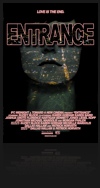 |
 | Chronicle
Doing for superhero films what 2008's "Cloverfield" did for monster and alien-invasion pics, "Chronicle" needed only a thrifty reported $12-million price tag to achieve a dizzyingly massive scope, legitimately escalating thrills, and an overall creative and thematic resourcefulness that films with four to ten times the budget would be undeniably envious of. Discovering its many pleasures, with each new scene deliciously upping the ante, was one of early 2012's most unexpected moviegoing surprises. With little buzz behind it, first-time director Josh Trank managed to fly under the radar as he prepped, shot and edited a work of pop art that seemingly came out of nowhere to wake audiences from their complacent doldrums. While respecting the rules of classic comic book tales about super-powered heroes and foes, Trank and screenwriter Max Landis simultaneously gathered the nerve to both rewrite and reinvent them—and, for that matter, found-footage films—in astonishing ways. It is not hyperbole to suggest that 2008's "The Dark Knight" now has a companion as the best of the best in its subgenre. In an age when cinema so sparsely amazes anymore—it seems like everything's been done and seen before—"Chronicle" is a motion picture that does just that, again and again. |
 |
 | The Cabin in the Woods
Don't let the title fool you. The smashing directorial debut of Drew Goddard and respective brainchild of he and co-scribe Joss Whedon, "The Cabin in the Woods" audaciously, at times awe-inspiringly, subverted, toyed with and trampled upon every cliché and expectation that typically comes with a genre pic set in this one's foreboding title locale. Like a post-modern update of 1987's "Evil Dead II: Dead by Dawn" as masterminded by a Lovecraft-obsessed existentialist who has set out to make the ultimate horror movie to end all horror movies, the film is blackly comic, thrillingly creepy, and then something wholly transcendent. An outright blast while still having more on its mind than just a body count, "The Cabin in the Woods" was a motion picture about the endurance of horror as a historical watermark, where it has been, and where it might be able to go from here. No less than an all-encompassing celebration of a too often spit-upon genre, fans are sure to be savoring this one for decades to come. |
 |
 | Prometheus
To call "Prometheus" the origin story of 1979's seminal outer-space monster movie "Alien" is both accurate and misleading. Set primarily in 2093, roughly thirty years prior to the fateful voyage of the Nostromo, this eagerly-awaited return to form for veteran filmmaker Ridley Scott built astronomically upon the earlier story's mythology while also proudly and disparately standing apart as its own entity. Not content to merely rehash what's been done before, Scott and screenwriters Jon Spaihts and Damon Lindelof crafted both a thigh-clenchingly frightening science-fiction epic as well as a ruminative, soul-baring existential study not afraid to ask the tough questions. Where do we come from? Do we have a Creator? What happens after we die? "Prometheus" isn't presumptuous enough to have all the answers, and that's just one of the reasons why it is such an unforgettable journey into the unknown. Like 1968's "2001: A Space Odyssey," 1997's "Contact" and 2001's "A.I.: Artificial Intelligence" before it, it not only demands deeper consideration after the fact, but earns it. Don't take this writer's word that "Prometheus" is a groundbreaking feat of visionary art, though; see it for yourself, open your mind, and prepare to be awed. |
 |
 | Cloud Atlas
Readers of David Mitchell's massive, ruminative, centuries-spanning 2004 opus claimed it was unfilmable, but they were wrong; the key was in adapting said literature into a filmic language without losing the ideas and spirit behind the written word. "Cloud Atlas" is a staggering, symphonic watermark in cinema, a 172-minute historic sci-fi travelogue of the past and distant future, of humanity living and dying and loving and fighting to change their own existences and those that will set foot on the same ground they've walked on long after they're gone. Written for the screen and directed by Tom Tykwer and Lana & Andy Wachowski, the film is easily the most accomplished work of all their careers, a sweeping study on how our actions, large and small, have the power to reverberate through the ages. Beyond that, its visuals are often breathtaking in their grandeur and artistry, with Frank Griebe's and John Toll's electric cinematography fully living up to the immense scope that the story demands. Moving with urgency, Alexander Berner's editorial prowess masterfully finding the parallels between its six time frames, "Cloud Atlas" nonetheless takes the time to listen to, and exhibit aching empathy for, its mountainous collection of characters (nearly all of the actors are featured in up to six different roles, many of them unrecognizable under make-up and effects wizardry). The finished picture is a sensory overload in the best way, bursting with such imagination and thematic complexity that one viewing is simply not enough by a long shot. Dripping with startling ambition, divine beauty and purpose, "Cloud Atlas" is a transcendent motion picture, unlike any other that's ever been made. Mere descriptions cannot possibly do it justice. |
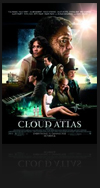 |
|
© 2012 by Dustin Putman
 |
|
|
|